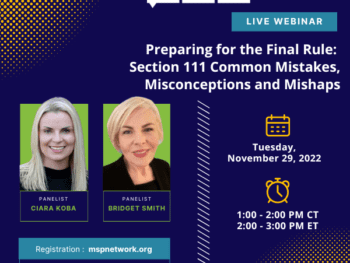With the new emphasis on reporting all work comp claims to Centers for Medicare and Medicaid Services (CMS), the claim adjusters are much less likely to “overlook” the MSA requirements. It is much better for you if your adjusters correct your MSA compliance oversights than for CMS to identify them and hold you responsible for the correction plus fines and penalties. (Under the SCHIP Extension Act, the fine for not reporting a claim is $1,000 per day, per claim for claims settled on or after July 1, 2009). It could very well be you will need a little help to be sure your company is in compliance.
Prior to the implementation of the Medicare Secondary Payor Mandatory Reporting Provisions in Section 111 of the Medicare, Medicaid and SCHIP Extension Act of 2007, complying with the Medicare Set-aside Arrangement (MSA) statutes was almost on an honor system. While the MSA statutes have been around since 1981, there was very limited enforcement.
Responsible Reporting Entities (RRE)—insurers, self-insureds, self-insurance pools and state funds –knew they were required to report their workers' compensation claims and obtain approval of the proposed MSA where:
(1) the claimant was already on Medicare or Medicaid and the work comp settlement was greater than $25,000, or
(2) there was a reasonable expectation the claimant would be applying for Medicare within the 30 months and the work comp settlement was greater than $250,000.
(3) MSA allocations are required on all work comp claims under $25,000 where the claimant is already on Medicare, but the MSA does not have to be submitted to the CMS for approval.
(4) The total settlement is under $250,000 and the claimant is within 30 months of becoming entitled to Medicare.
However, if the claim adjusters for the RRE did not report the work comp claim to the Centers for Medicare and Medicaid Services (CMS) there was not a great risk they would be caught. With the SCHIP Extension Act of 2007 that has changed dramatically.
Under the requirements of the SCHIP Extension Act every work comp claim must be reported in an electronic format to the CMS division of the Department of Health & Human Services. On January 1, 2010 CMS began testing the reporting system. In the second quarter, April to June 2010, all RREs must submit their first live production file. CMS will electronically compare the identity of your work comp claimants with their Medicare beneficiaries.
Work comp claimants who meet the MSA guidelines better have the required MSA approval from CMS. Without the CMS approved MSA the claimant is free to spend the work comp settlement on a new car or a new house or whatever rather than saving it for future medical care related to the work comp claim. Then the claimant applies for and gets Medicare. When CMS/Medicare learns it has been paying for work comp related medical care, it will ask the claimant for its money back. The claimant having spent all of the work comp settlement will not be able to pay. Big surprise!
CMS will then ask the employer and/or insurer for their money back. If CMS has to go to court to get their money back, the amount is doubled. In essence, without the approved MSA you pay the future medical cost twice, once to the claimant with the settlement and again when Medicare ask for reimbursement of the medical care they paid on behalf of the claimant.
Some claim adjusters or attorneys in their efforts to circumvent the MSA requirements put language in the settlement agreement saying the claimant is responsible for the cost of all future medical care. Sorry, that will not work. The federal laws trump the settlement agreement every time. The claimant and then the employers and insurers are still bound by the requirements of the MSA statutes.
Going forward, your claims adjusters should have systems in place to verify they are in compliance with the MSA requirements of CMS. The problems arise when you look backwards. There is no statute of limitations on compliance with the MSA requirements. The CMS can review claims closed last year or five years ago or back to 1981 to check for compliance with the MSA approval requirements. (workersxzcompxzkit)
The dilemma now for self-insureds, self-insurance pools and insurers is what to do about the work comp claims already closed. While your claims department manager could drop everything else and start reviewing the closed files, it usually makes better sense and causes less disruption to your day-to-day activities to hire an outside consultant to come in and review your closed work comp files for CMS compliance. The CMS Consultant identifies those files where you are exposed to paying the future medical care again. A CMS compliance audit is easy to arrange, just contact us for a referral to a CMS Auditor.
Author Robert Elliott
Podcast/Webcast: How To Prevent Fraudulent Workers' Compensation Claims Click Here http://www.workerscompkit.com/gallagher/podcast/
Fraudulent_Workers_Compensation_Claims/index.php
We accept articles about WC cost containment. Contact us at: Info@WorkersCompKit.com.
Visit Our Websites: www.ReduceYourWorkersComp.com/
TD Calculator: www.reduceyourworkerscomp.com/transitional-duty-cost-calculator.php
WC Calculator: http://www.reduceyourworkerscomp.com/calculator.php
TD Calculator: www.reduceyourworkerscomp.com/transitional-duty-cost-calculator.php
WC Calculator: http://www.reduceyourworkerscomp.com/calculator.php
Do not use this information without independent verification. All state laws vary. You should consult with your insurance broker or agent about workers' comp issues.
©2009 Amaxx Risk Solutions, Inc. All rights reserved under International Copyright Law. If you would like permission to reprint this material, contact Info@WorkersCompKit.com

























